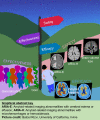Key questions for the evaluation of anti-amyloid immunotherapies for Alzheimer's disease
- PMID: 37389302
- PMCID: PMC10306158
- DOI: 10.1093/braincomms/fcad175
Key questions for the evaluation of anti-amyloid immunotherapies for Alzheimer's disease
Abstract
The clinical benefit associated with anti-amyloid immunotherapies, a new class of drugs for the treatment of Alzheimer's disease, is predicated on their ability to modify disease course by lowering brain amyloid levels. At the time of writing, two amyloid-lowering antibodies, aducanumab and lecanemab, have obtained United States Food and Drug Administration accelerated approval, with further agents of this class in the Alzheimer's disease treatment pipeline. Based on limited published clinical trial data to date, regulators, payors and physicians will need to assess their efficacy, clinical effectiveness and safety, as well as cost and accessibility. We propose that attention to three important questions related to treatment efficacy, clinical effectiveness and safety should guide evidence-based consideration of this important class of drugs. These are: (1) Were trial statistical analyses appropriate and did they convincingly support claims of efficacy? (2) Do reported treatment effects outweigh safety concerns and are they generalizable to a representative clinical population of people with Alzheimer's disease? and (3) Do the data convincingly demonstrate disease course modification, suggesting that increasing clinical benefits beyond the duration of the trials are likely? We suggest specific approaches to interpreting trial results for these drugs and highlight important areas of uncertainty where additional data and a cautious interpretation of existing results is warranted. Safe, effective and accessible treatments for Alzheimer's disease are eagerly awaited by millions of patients and their caregivers worldwide. While amyloid-targeting immunotherapies may be promising disease-modifying Alzheimer's disease treatments, rigorous and unbiased assessment of clinical trial data is critical to regulatory decision-making and subsequently determining their provision and utility in routine clinical practice. Our recommendations provide a framework for evidence-based appraisal of these drugs by regulators, payors, physicians and patients.
Keywords: Alzheimer; MCI; amyloid immunotherapy; dementia; disease-modifying.
Published by Oxford University Press on behalf of the Guarantors of Brain 2023.
Conflict of interest statement
Independent of this work, N.V. received research support from Fondation Bettencourt-Schueller, Fondation Servier, Union Nationale pour les Intérêts de la Médecine (UNIM), Fondation Claude Pompidou, Fondation Alzheimer and Fondation pour la Recherche sur l’Alzheimer; travel grant from the Movement Disorders Society, Merz-Pharma, UCB Pharma, and GE Healthcare SAS; is an unpaid local principal investigator or sub-investigator in NCT04241068 and NCT05310071 (aducanumab, Biogen), NCT04437511 (donanemab, Eli-Lilly), NCT05463731 (remternetug, Eli-Lilly), NCT04592341 (gantenerumab, Roche), NCT03887455 (lecanemab, Eisai), NCT03352557 (gosuranemab, Biogen), NCT03828747 and NCT03289143 (semorinemab, Roche), NCT04619420 (JNJ-63733657, Janssen—Johnson & Johnson), NCT04374136 (AL001, Alector), NCT04592874 (AL002, Alector), NCT04867616 (bepranemab, UCB Pharma), NCT04777396 and NCT04777409 (semaglutide, Novo Nordisk); and has given unpaid lectures in symposia organized by Eisai and the Servier Foundation. During the past 3 years, V.P. was a local unpaid investigator or sub-investigator for the following trials: Evoke and Evoke + (NCT04777396, NCT04777409, NovoNordisk), Tango and Embark (NCT03352527, NCT04241068, Biogen), Lucidity (NCT03446001, TauRx Pharmaceuticals), Autonomy (NCT04619420, Janssen), Green Memory (NCT04520412, Green Valley Pharmaceuticals) and INFRONT-3 (NCT04374136, Alector). He received research grants from Fondation Bettencourt-Schueller (CCA-Inserm-Bettencourt) and from Fondation PSP-France. M.T. served as member of FDA Peripheral and Central Nervous System (PCNS) advisory committee evaluating Biologics License Application (BLA) 761178 for aducanumab solution for intravenous infusion for the treatment of Alzheimer’s disease. This service was not remunerated and was performed as part of his official duties as an NIH employee. The other authors do not have any relevant disclosures.
Similar articles
-
High-clearance anti-amyloid immunotherapies in Alzheimer's disease. Part 1: Meta-analysis and review of efficacy and safety data, and medico-economical aspects.Rev Neurol (Paris). 2022 Dec;178(10):1011-1030. doi: 10.1016/j.neurol.2022.06.012. Epub 2022 Sep 29. Rev Neurol (Paris). 2022. PMID: 36184326 Review.
-
The case for regulatory approval of amyloid-lowering immunotherapies in Alzheimer's disease based on clearcut biomarker evidence.Alzheimers Dement. 2025 Jan;21(1):e14342. doi: 10.1002/alz.14342. Epub 2024 Nov 13. Alzheimers Dement. 2025. PMID: 39535341 Free PMC article. Review.
-
High-clearance anti-amyloid immunotherapies in Alzheimer's disease. Part 2: putative scenarios and timeline in case of approval, recommendations for use, implementation, and ethical considerations in France.Rev Neurol (Paris). 2022 Dec;178(10):999-1010. doi: 10.1016/j.neurol.2022.08.002. Epub 2022 Nov 3. Rev Neurol (Paris). 2022. PMID: 36336488 Review.
-
Anti-Amyloid Immunotherapies for Alzheimer's Disease: A 2023 Clinical Update.Neurotherapeutics. 2023 Jul;20(4):914-931. doi: 10.1007/s13311-023-01405-0. Epub 2023 Jul 25. Neurotherapeutics. 2023. PMID: 37490245 Free PMC article. Review.
-
Novel anti-amyloid-beta (Aβ) monoclonal antibody lecanemab for Alzheimer's disease: A systematic review.Int J Immunopathol Pharmacol. 2023 Jan-Dec;37:3946320231209839. doi: 10.1177/03946320231209839. Int J Immunopathol Pharmacol. 2023. PMID: 37902139 Free PMC article.
Cited by
-
Targeting Soluble Amyloid Oligomers in Alzheimer's Disease: A Hypothetical Model Study Comparing Intrathecal Pseudodelivery of mAbs Against Intravenous Administration.Diseases. 2025 Jan 16;13(1):17. doi: 10.3390/diseases13010017. Diseases. 2025. PMID: 39851481 Free PMC article.
-
Physical Exercise as Disease-Modifying Alternative against Alzheimer's Disease: A Gut-Muscle-Brain Partnership.Int J Mol Sci. 2023 Sep 28;24(19):14686. doi: 10.3390/ijms241914686. Int J Mol Sci. 2023. PMID: 37834132 Free PMC article. Review.
-
Prescribing anti-amyloid immunotherapies to treat Alzheimer's disease: Fully informing patient decisions.Alzheimers Dement (N Y). 2023 Oct 4;9(4):e12426. doi: 10.1002/trc2.12426. eCollection 2023 Oct-Dec. Alzheimers Dement (N Y). 2023. PMID: 37799322 Free PMC article. No abstract available.
-
Anti-amyloid therapies work for Alzheimer's disease.Brain Commun. 2023 Jul 17;5(4):fcad204. doi: 10.1093/braincomms/fcad204. eCollection 2023. Brain Commun. 2023. PMID: 37492486 Free PMC article. No abstract available.
-
Lost in translation: Inconvenient truths on the utility of mouse models in Alzheimer's disease research.Elife. 2024 Sep 27;13:e90633. doi: 10.7554/eLife.90633. Elife. 2024. PMID: 39329365 Free PMC article. Review.
References
-
- Dunn B, Stein P, Cavazzoni P. Approval of aducanumab for Alzheimer disease-the FDA's perspective. JAMA Intern Med. 2021;181(10):1276–1278. - PubMed
-
- Budd Haeberlein S, Aisen PS, Barkhof F, et al. . Two randomized phase 3 studies of aducanumab in early Alzheimer’s disease. J Prev Alzheimers Dis. 2022;9(2):197–210. - PubMed
-
- Terry M. Additional Deaths of Patients Taking Aduhelm Spark Renewed Concern. BioSpace 2022. Accessed 13 February 2023.https://www.biospace.com/article/additional-patient-deaths-in-patients-r....
Publication types
Grants and funding
LinkOut - more resources
Full Text Sources

